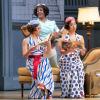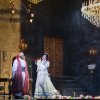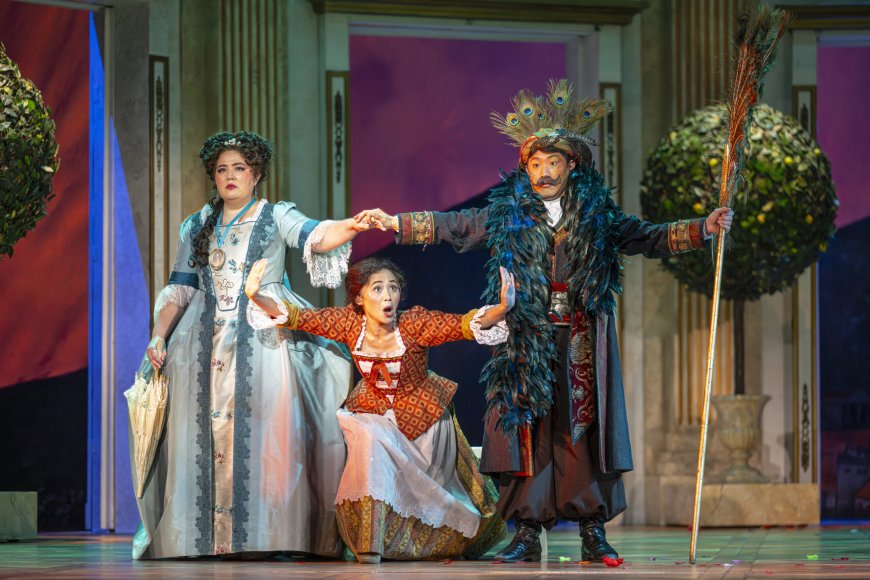
Opera San José is on a roll with its Mozart productions. Last season offered a charming production of The Magic Flute, 2022 brought a Bollywood-style production of The Marriage of Figaro, and now they’ve got a staging of Così fan tutte that’s so funny and so wonderfully performed you’ll want to see it more than once.
What’s more, it’s a staging with a twist: taking advantage of some ambiguity in the opera’s finale, the company puts the resolution of the plot in the hands of its audience.
Così is an opera of artifice, the basic premise of which is hardly believable. Sisters Fiordiligi and Dorabella are in love with soldiers Guglielmo and Ferrando. Don Alfonso, a friend of the soldiers — let’s make that “friend” considering how things work out — bets that Fiordiligi and Dorabella won’t remain faithful, then concocts a test of the sisters’ fidelity.
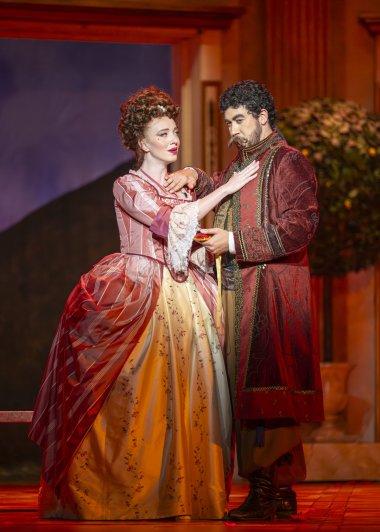
After the soldiers pretend to be called up to serve, they return in disguise with instructions to try to seduce the sister with whom they’re not already involved. Despina, the sisters’ maidservant, is recruited to help with the plot. Thus, the audience is somehow expected to believe that Fiordiligi and Dorabella are so naive, so foolish, and so unobservant that mustaches and fancy outfits render them incapable of recognizing their own lovers, even though one is a tenor (that’s Ferrando) and the other is a baritone (that’s Guglielmo).
Well, maybe the sisters are. By the end of the opera, Ferrando and Guglielmo have succeeded in their task — to their own consternation — with the predictable result of sowing anger among themselves and their (former?) lovers. Everyone’s feelings are hurt and it’s a wonder that each couple would even consider remaining together, as the libretto apparently calls for. What does the future hold for couples whose history includes such self-inflicted deception and heartbreak?
It’s this very question that allows Opera San José to leave the outcome up to the audience, which votes each night: do the original lovers really stay together? (That’s what the opening night audience went for.) Do the couples switch, as they did in the late Michael Cavanagh’s production for San Francisco Opera? Do they break up entirely, perhaps after heaping some well-deserved abuse on Don Alfonso? Or do Ferrando and Guglielmo, improbably, abandon the sisters and run off with each other instead? (That’s what happened at the dress rehearsal.)
In his OSJ debut, director Alek Shrader cleverly opens the door to all possibilities— he has planted an assortment of clues that make the different outcomes plausible. For example, in Act 1, the men accidentally run into each other’s arms for a brief moment, and Despina be seen caressing one of the sisters. Taking maximum advantage of the symmetry built into the libretto, Shrader has the soldiers or sisters regularly mirror or mimic each other’s physical actions.
Shrader is fortunate to have a superb cast of singing actors at his command. Bass-baritone Dale Travis knows exactly how to play the sly old scoundrel. Delightful soprano Nicole Koh hams it up hilariously as Despina and her two alter egos, the Doctor and the Notary — Koh positively fills the hall with her brilliant physical comedy.
Soprano Emily Michiko Jensen and mezzo-soprano Joanne Evans, respectively, portray Fiordiligi and Dorabella. Their characters might be a bit empty-headed, but these two Opera San José resident artists are fully mature singers. Jensen, who has a big, gleaming voice, gives a spectacular performance of “Come scoglio,” tossing off its leaps and fast triplets with aplomb. Evans, whose warm voice has a fine cutting edge, makes a funny and touching Dorabella.
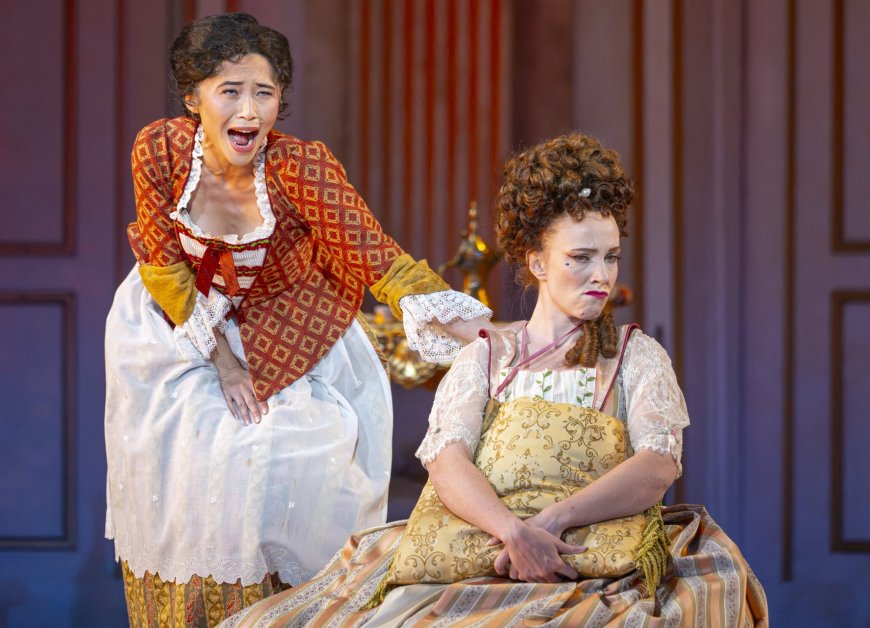
Evans is such a wonderful actor that you could clearly see Dorabella falling for Guglielmo, and given Ricardo José Rivera’s magnetic, sexy stage presence and beautiful baritone, who wouldn’t? But on the other hand, who would have the heart to abandon Jonghyun Park’s Ferrando? He has the sweetest, most elegant tenor imaginable, singing “Un’aura amorosa” with melting beauty.
Mozart is hard for singers because there’s nowhere to hide. Nothing can be fudged or smudged. In OSJ’s production of Così, the entire cast sings stylishly and securely. The musical leadership is in the best of hands, with music director Joseph Marcheso’s wondrously buoyant conducting and judicious tempos keeping all the musical elements in perfect balance. The orchestra sounds terrific.
Significant cuts are made in this production, including four arias and a couple of short duets. While I’d always rather hear more Mozart than less, it’s a long piece and the cuts don’t upset the dramatic flow in any way.
All in all, this is a must-see hit. Four performances remain, at 7:30 p.m. on Fridays, Sept. 19 and 26, and at 2 p.m. on Sundays, Sept. 21 and 28. Get your tickets, consider your options, and be prepared to vote for your preferred ending.


